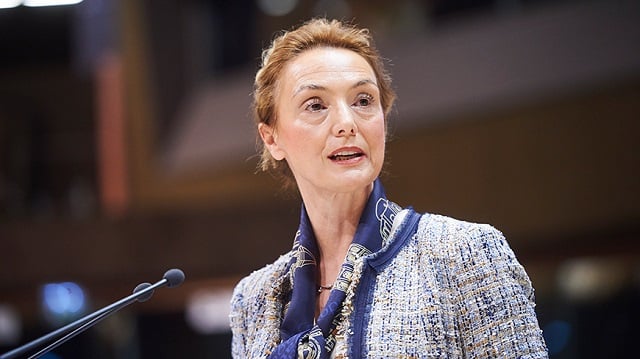On 23 February Secretary General Marija Pejčinović Burić addressed the 46th session of the Human Rights Council by video link.
Dear friends,
When I addressed your 43rd Session, almost exactly one year ago, the world was very different.
Since then, COVID-19 has changed how we live and work.
Read also
And it has presented new human rights challenges to which our organisations must respond.
I have been clear from the beginning of the pandemic about the importance of governments addressing the public health crisis with measures that are effective and which also uphold common legal standards:
And at the Council of Europe we are working with our member states to do just that:
An approach that was reaffirmed by the Athens Declaration issued at the end of our Ministerial Session last year,
Back in April, I provided the governments of our 47 member states with a toolkit document.
This confirmed that the European Convention on Human Rights must apply to any COVID-related steps that they take.
For example, states of emergency and emergency measures must comply with the terms of the treaty.
And this means that they should be necessary, proportionate and limited in duration.
Since then, all parts of the Organisation have worked to address the issues that have emerged in line with the European Convention and the European Social Charter.
These have included domestic violence, access to education, the protection of migrants’ rights, the prevention of discrimination against minorities, and the privacy and data protection implications that arise from the use of tracing apps.
The crisis is far from over of course and the longer-term economic impact of coronavirus is yet to be fully felt, as are its social consequences.
So, we can be sure that further problems will emerge, and we will be ready to play our role in addressing them.
Certainly, the right to the protection of health will continue to underpin our approach.
This complements the UN’s Sustainable Goal number 3:
To ensure healthy lives and to promote well-being for all at all ages.
And at the Council of Europe we are proud to contribute to this and other aims that comprise Agenda 2030.
In fact, my Strategic Framework for our Organisation – published in November – is explicit about the importance of enhancing the links between the Organisation’s activities and specific SDGs.
Whether we think of gender equality, the pursuit of peace, justice and strong institutions, or other relevant areas, our work complements these aims, and we will pursue it with vigour.
*****
This is natural because the Council of Europe and the United Nations share so much in common.
Not just a belief in human rights.
But faith in multilateralism.
And a determination to make progress both in the current climate and beyond it.
The threats to human rights that existed before coronavirus have not gone away.
They continue, and so does our work to confront them.
Whether we think about freedom of expression and media freedom, hate speech online and offline, discrimination against minorities, the independence of the judiciary or the fights against corruption, money-laundering and cybercrime, the challenges are plain to see.
But even in these extraordinary times, progress is possible.
On the Protection of Children against Sexual Exploitation and Sexual Abuse, the Council of Europe’s Lanzarote Convention has now been ratified by all our member states.
On the environment, we are working towards new legal instruments that will protect Human Rights and counter environmental crimes.
And on Artificial Intelligence, we are progressing on the elements of a framework for the development, design and application of AI, following the guidelines we published last month on the use of facial recognition technology.
I am also happy to confirm that I have recently appointed a Special Representative on Antisemitic, anti-Muslim and other forms of religious intolerance and hate crimes.
He is liaising with member states and other international organisations, including with the United Nations Special Rapporteur on freedom of religion or belief, on ways to address these problems.
There are plenty of other good and welcome examples of where our two organisations work together.
And I was particularly pleased that my Special Representative on Migration and Refugees was able to participate in last November’s European Review of the Global Compact for Migration.
But we should always look out for new ways in which we can learn, complement and bolster one another.
Take the Council of Europe’s monitoring bodies.
It is good that they already contribute positively to the Human Rights Council’s Universal Periodic Review,
And right that we are now looking to coordinate our monitoring more efficiently – to better facilitate reporting obligations and reduce monitoring fatigue.
More ambitious still, we should be open to the idea that we can coordinate monitoring practices more effectively between our Organisations too.
This is important for avoiding duplication.
Any changes would of course have the same shared goal as all our joint work:
To ensure that we complement one another and that we remain relevant and effective.
With a European human rights Organisation with common legal standards working hand in hand with a global human rights Organisation of unparalleled reach.
Together, we can embed the reality of human rights more deeply in these and whatever future circumstances we face.
And from this, only good things can come.
46th Session of the Human Rights Council – Discours 2021
Council of Europe


























































